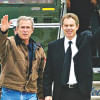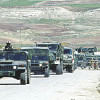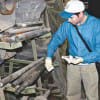A war for oil-Last Part: The fragmented land
The Iraq War, in its aftermath, has created dreaded forces like the al-Qaeda, the IS, the ISIS, or the ISIL.
As the various regions of the Middle East today lie in ruins, causing hundreds and thousands to flee as refugees, the Shias and Sunnis battle out their centuries-old rivalries to regain superiority in a land balkanized along ethnic identities.
The world today has turned into an unsafe place, the like of which the world has never known and it seems there is no end in sight.
Dhaka was free of its persistent dusts that Ramadan evening because of a monsoon shower. Iftar was just over at the end of a long day. Local and expat patrons had gathered to chat away a pleasant time inside the posh Spanish restaurant, Holey Artisan, right at the heart of Dhaka's diplomatic zone when five young men, all in their teens and 20s, entered with backpacks. The pleasant conversations over dinner were violently disrupted as the youths brought out automatic weapons from their backpacks and sprayed the helpless diners with small caliber bullets. They then finished the mayhem by butchering the survivors with machetes. Their target was the foreigners.
As things slowly and painfully unfolded, it became clear that the youths were all inspired by the Islamic State propaganda. It was July 1, 2016.
More than a decade ago on a bright spring day in 2004, as Shias had been celebrating their holy month in Karbala, bombs went off, killing 140 people. Al-Qaeda was responsible for the attack.
Stories of similar brutal attacks keep popping up from Baghdad to Paris to Germany to New York to London to Syria to Egypt.
The fact remains, all this was predicted and warned about much earlier. And all the intelligence warnings were ignored by the US and UK when they launched the invasion of Iraq in 2003.
The world has changed since then, probably forever.
As a direct result of the Iraq war, the Middle East today lies fragmented with sectarian violence erupting everywhere. The Iraq war has suddenly stoked up the festering schism between the Shia and Sunni Muslims, the seed of which was sowed in the early years of Islam.
As a fallout of the war, the IS has grown and gained in power before being crushed recently, and al-Qaeda has found new breeding grounds and targets.
This one war has touched almost every nation on the map, in one way or another. The world today is a much unsafe place to live in than the illusory "stability" the US administration had sought in the Arab region through the invasion.
The other casualties of the war are the moral high ground that the West and the UN claimed after the Second World War. The West that had formed the United Nations for peace after the devastating Second World War with the pledge of "Never Again" have its hands stained with Arab bloods through the illegal and unjust war thrust upon Iraq. The West today stands accused of war crimes. And the UN has been proven too flawed and weak when it comes to the manipulations of the powerful nations.
AN OLD FEUD REVIVES
The Shia–Sunni divide is 14-century-old. After the death of the Prophet, there was a protracted debate on who were to bear the mantle of the Khilafat or the torch bearer of the Muslims. There were strong expectations among the followers and family of Hajrat Ali (RA), who was the one of the earliest converts to Islam and the Prophet's son-in-law, that he would become the Khalifa. But instead Hajrat Abu Bakr (RA), the Prophet's father-in-law became his successor after his death.
On three consecutive occasions, after each Khalifa's death, Hajrat Ali (RA) was sidelined. And finally, when Khalifa Hajrat Usman (RA) died, he became the fourth Khalifa.
Hajrat Ali (RA) did not enjoy widespread support among the governors of Egypt and later was opposed by some of his own guards. A bitter internal rivalry began that culminated in the Battle of the Camel in which Hajrat Ali's (RA) opponent was the Prophet's youngest widow, Hajrat Ayesha (RA). Although Ali (RA) won the battle, the rivalry did not end.
The Shias, the followers of Hajrat Ali (RA), remain a minority, about one-fifth of the Muslim population, mainly in the Arab world, and comprise part of the sharply defined and finely balanced jigsaw puzzle of Shias and Sunnis where the pieces still fit.
The imperial powers, mainly Britain, France and Italy, exploited the old festering enmity during the First World War to play their imperial game in the Middle East and it brought back the old tension to the surface.
What is today's Iraq, Syria, Libya, Lebanon, Palestine and Jordan, were once part of the Ottoman empire that reached its height in the 14th century and even made forays into Europe, conquering the Balkans and southern Europe. With the empire's eventual decline in the 18th and 19th century, much of its European footprint was gone.
The final disintegration came when the Ottomans sided with Germany in the First World War and lost. Britain and France carved up the Ottoman empire and created new countries, each as their colonies.
Britain took control of Iraq, carving it out of three Ottoman provinces – one dominated by the Shias, one by the Sunnis and the other by the non-Arab Kurds. Thus, a large part of ancient Mesopotamia became Iraq.
Then the other part of Mesopotamia was divided into new lands. France took one such vast piece named Syria and also took the smaller slice of Lebanon. The British grabbed Palestine and Transjordan that would much later become Jordan and Israel. Italy, late in the game of land grabbing, took over Libya.
It was then the colonisers played their old game of divide-and-rule to ramp up sectarian tensions. It often happened that they picked a minority group and started supporting them to power. After all, a minority placed in power would hardly think of betraying its enablers. This is how the Sunnis came to control a majority Shia in Iraq, or an Alawite minority rooted in Shiaism came to control a Sunni Syria, or in Bahrain, the minority Sunnis ruled.
This empowerment policy necessarily did not follow religiosity. The Arab society is divided along a complex web of clans, sub-clans, tribes and sub-tribes. This made the power question ever more critical.
Now back to the modern times.
When Saddam Hussein grabbed power in Iraq in 1968, he would also play this sectarian divisive game of statesmanship and purged his Ba'athist party of Shias, the majority population. Saddam kept any sectarianism in check because he had set up a harsh order.
But after the Iraq war, a sudden and violent change took over that unsettled the puzzle pieces. As Saddam's regime fell, so did the ruling Sunnis. The Shias found a newly discovered dominance.
The Shias control some crucial power centres like in Iran where the ruling class and majority of the population are Shia. Syria is a Sunni country with the Shias headed by Bashar al-Assad in power. Hezbollah is a powerful Shia military group in Lebanon that has fought several wars with Israel and even put the Jewish state forces in deep trouble and to shame during the 34-day war in 2006.
Iraq is a Shia majority country. But a Sunni Saddam Hussein ruled supreme with the 65 percent Shia population left out of power and somewhat suppressed.
This century old semblance of calm and balance suddenly fell apart with the invasion of Iraq and the fall of Saddam.
Shia Iran, an arch enemy of Iraq, suddenly found a new friend in the Shia-ruled Baghdad, a prospect that the West did not anticipate or just ignored in its zeal to dislodge Saddam.
The Shia-led government of Iraq immediately went on a Sunni purge. It set up a de-Ba'athism Council and sacked the old military and security personnel of Saddam Hussein, mostly Sunnis. The Sunnis lost government jobs as well. In a clannish society where jobs are served on the basis of clan loyalty, this meant tribe after tribe, clan after clan becoming jobless overnight.
Suddenly the whole Arab world saw empowerment in reviving their sectarian identities. But it didn't go too well. Majority Shias in Sunni-ruled Bahrain wanted to clamber back to power only to be ruthlessly quelled. Sunnis in Egypt and Saudi Arabia started chanting against mistreatment of their brethren in Iraq and Syria.
Countries like Iran, Saudi Arabia, Qatar, Yemen, Lebanon and Turkey were all pitted against one another. The Saudis became wary of Iran's rising power because of the changes in Iraq. It got into actions that would undermine Iran in many ways including the ban on Iranian pilgrims in Hajj and the strange "kidnapping" case of the pro-Iran Lebanese minister in Saudi Arabia.
The main sectarian clash flared back in Iraq and spread into Syria and Yemen. The Sunnis, the Ba'athists and other clans deprived of their long-held power, took up arms, attacking government forces and Shia civilians alike. Car bombing and suicide attacks became regular occurrences in Baghdad and other parts of the country.
In this dark cauldron was born the Islamic State (IS), a fearsome Sunni-backed militant group imbued with the ideals of Wahhabism. IS's birth is also controversial because of its timing at the peak of Israel's attack in Lebanon that had seen mounting civilian deaths, upwards of 3,000, and evoked sharp world criticism.
Iran came into the fray to fight IS because the group's main target were the Shias. And then the Kurds also took up arms because the bloodthirsty IS targeted them as well.
As the US sought Iranian and Shia help to fight the IS, the Saudis became uneasy. With US support for the Kurds in the fight against IS, Turkey became nervous because the Kurds laid a claim to a part of Turkey. Istanbul started shelling the Kurds.
But as if the lamentable condition of Iraq was not enough for the West to understand the cost of such invasions, as if the collective memory of the West suffered amnesia and that is why all of a sudden, images of brand new 4WD vehicles decked with heavy machine guns and rocket launchers started emerging from Libya and Syria. Suddenly there were money and arms from invisible sources flying into the hands of the so-called Libyan dissidents and Free Syrian Army.
As logic followed, Shia Hezbollah soldiers vowed to save Shia Asad and marched into Syria. The Hezbollah has some fierce fighters and has a long history of war with Israel. Their entry into Syria startled many including Israel and the Saudis, drawing them even more into the conflict.
Libya fell quickly with its leader Muammar Gaddafi captured and lynched by the dissidents, and the world saw the UK Prime Minister David Cameron standing on the balcony in Benghazi on September 15, 2011 to laud Libya's new freedom.
It didn't take long for Libya to further slide into chaos and violence as all types of sectarian fighting erupted. Today Libya is more recognizable as a state similar to Iraq.
The UK, still unsatisfied until Syria was down, wanted to intervene in Damascus. Fortunately, Cameron lost the vote in August 2013 and Syria survived with the full backing of Russia. But the land has been pulverized by air strikes by all types of forces – the Turks, the Americans, the Syrians and everybody else.
As war and devastation gripped the whole region, the only option left for the civilians was to flee and eventually it all resulted in a huge refugee crisis. Millions of Iraqis, Syrians and Yemenis crossed the Mediterranean to take shelter in Europe and any country willing to take them. Politics and social realities of the refugees changed forever with radical views rising swiftly among them.
The IS found a safe operating route there on the Syrian-Iraq border from where they pushed inside and finally captured Mosul, just miles away from Baghdad.
As the IS's overwhelming victory rolled across the land, the world reacted with fear. Its ideologies spread to touch almost every land from Bangladesh to Canada to Europe where hundreds died in terrorist attacks. The Holey Artisan victims were sad casualties of it.
When the IS was finally defeated by the Russians and by the Iraqi Shia militia, Mosul was in ruins.
Buried beneath the rubbles lie the ideologies of IS, the atavistic form of Islamic caliphate.
Today, the Arab land seem to be in a deep dark hole of war, deaths and bitter rivalry where the equation is changing every day, where bombs falling out of the clear blue desert sky into people's homes and blowing lives to smithereens is any day's occurrence. With its oil reserve depleting, prospect of peace in the Middle East seems to have evaporated as fast as a drop of water on the hot desert sand of the Middle East. As the region bleeds, there seems to be no end to its pitiful state on the imperialist chessboard.

 For all latest news, follow The Daily Star's Google News channel.
For all latest news, follow The Daily Star's Google News channel. 








Comments